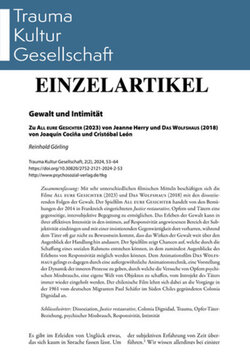12 Seiten, PDF-E-Book
Erschienen: Mai 2024
Bestell-Nr.: 36540
https://doi.org/10.30820/2752-2121-2024-2-53
abonnieren
Reinhold Görling
Gewalt und Intimität (PDF)
Zu All eure Gesichter (2023) von Jeanne Herry und Das Wolfshaus (2018) von Joaquín Cociña und Cristóbal León
Sofortdownload
Dies ist ein E-Book. Unsere E-Books sind mit einem personalisierten Wasserzeichen versehen,
jedoch frei von weiteren technischen Schutzmaßnahmen (»DRM«).
Erfahren Sie hier mehr zu den Datei-Formaten.
Mit sehr unterschiedlichen filmischen Mitteln beschäftigen sich die Filme All eure Gesichter (2023) und Das Wolfshaus (2018) mit den dissoziierenden Folgen der Gewalt. Der Spielfilm All eure Gesichter handelt von den Bemühungen der 2014 in Frankreich eingerichteten Justice restaurative, Opfern und Tätern eine gegenseitige, intersubjektive Begegnung zu ermöglichen. Das Erleben der Gewalt kann in ihrer affektiven Intensität in den intimen, auf Responsivität angewiesenen Bereich der Subjektivität eindringen und mit einer insistierenden Gegenwärtigkeit dort verharren, während dem Täter oft gar nicht zu Bewusstsein kommt, dass das Wirken der Gewalt weit über den Augenblick der Handlung hin andauert. Der Spielfilm zeigt Chancen auf, welche durch die Schaffung eines sozialen Rahmens entstehen können, in dem zumindest Augenblicke des Erlebens von Responsivität möglich werden können. Dem Animationsfilm Das Wolfshaus gelingt es dagegen durch eine außergewöhnliche Animationstechnik, eine Vorstellung der Dynamik der inneren Prozesse zu geben, durch welche die Versuche von Opfern psychischen Missbrauchs, eine eigene Welt von Objekten zu schaffen, vom Introjekt des Täters immer wieder eingeholt werden. Der chilenische Film lehnt sich dabei an die Vorgänge in der 1961 vom deutschen Migranten Paul Schäfer im Süden Chiles gegründeten Colonia Dignidad an.
Abstract:
Using very different cinematic techniques, the films Je verrai toujours vos visages (2023) and La casa lobo (2018) deal with the dissociative consequences of violence. The feature film Je verrai toujours vos visages deals with the efforts of the Justice restaurative established in France in 2014 to allow victims and perpetrators a mutual, intersubjective encounter. In its affective intensity, the experience of violence can penetrate the intimate realm of subjectivity that is dependent on responsiveness and remain there with an insistent presence, while the perpetrator often does not even realise that the effects of the violence continue far beyond the moment of the act. The feature film shows the opportunities that can arise through the creation of a social framework in which at least moments of experiencing responsiveness are possible. The animated film La casa lobo, on the other hand, uses an unusual animation technique to give an idea of the dynamics of the inner processes through which the attempts of victims of psychological abuse to create their own world of objects are repeatedly caught up by the introject of the perpetrator. The Chilean film is based on the events in the Colonia Dignidad founded by the German migrant Paul Schäfer in southern Chile in 1961.
Abstract:
Using very different cinematic techniques, the films Je verrai toujours vos visages (2023) and La casa lobo (2018) deal with the dissociative consequences of violence. The feature film Je verrai toujours vos visages deals with the efforts of the Justice restaurative established in France in 2014 to allow victims and perpetrators a mutual, intersubjective encounter. In its affective intensity, the experience of violence can penetrate the intimate realm of subjectivity that is dependent on responsiveness and remain there with an insistent presence, while the perpetrator often does not even realise that the effects of the violence continue far beyond the moment of the act. The feature film shows the opportunities that can arise through the creation of a social framework in which at least moments of experiencing responsiveness are possible. The animated film La casa lobo, on the other hand, uses an unusual animation technique to give an idea of the dynamics of the inner processes through which the attempts of victims of psychological abuse to create their own world of objects are repeatedly caught up by the introject of the perpetrator. The Chilean film is based on the events in the Colonia Dignidad founded by the German migrant Paul Schäfer in southern Chile in 1961.
Wolfgang Wöller, Ursula Gast & Reinhold Görling S. 5–8Editorial (PDF)
DissoziationUrsula GastS. 9–33Und es gibt sie doch … (PDF)
Die dissoziative Identitätsstörung und die aktuelle Kontroverse um die Erkrankung1Wiebke PapeS. 35–51Der sogenannte ›Täterkontakt‹ - ein simplifizierender Begriff für komplexe Bindungen1 (PDF)
Reinhold GörlingS. 53–64Gewalt und Intimität (PDF)
Zu All eure Gesichter (2023) von Jeanne Herry und Das Wolfshaus (2018) von Joaquín Cociña und Cristóbal LeónSilvia BahlS. 65–76Das Shmoo (PDF)
Therapeutisches Feld, Figurabilität und die Ko-Konstruktion psychischer StrukturWolfgang WöllerS. 77–101Trance und Besessenheitszustände (PDF)
Dissoziative Bewusstseinsstörungen im kulturellen Kontext
DissoziationUrsula GastS. 9–33Und es gibt sie doch … (PDF)
Die dissoziative Identitätsstörung und die aktuelle Kontroverse um die Erkrankung1Wiebke PapeS. 35–51Der sogenannte ›Täterkontakt‹ - ein simplifizierender Begriff für komplexe Bindungen1 (PDF)
Reinhold GörlingS. 53–64Gewalt und Intimität (PDF)
Zu All eure Gesichter (2023) von Jeanne Herry und Das Wolfshaus (2018) von Joaquín Cociña und Cristóbal LeónSilvia BahlS. 65–76Das Shmoo (PDF)
Therapeutisches Feld, Figurabilität und die Ko-Konstruktion psychischer StrukturWolfgang WöllerS. 77–101Trance und Besessenheitszustände (PDF)
Dissoziative Bewusstseinsstörungen im kulturellen Kontext

